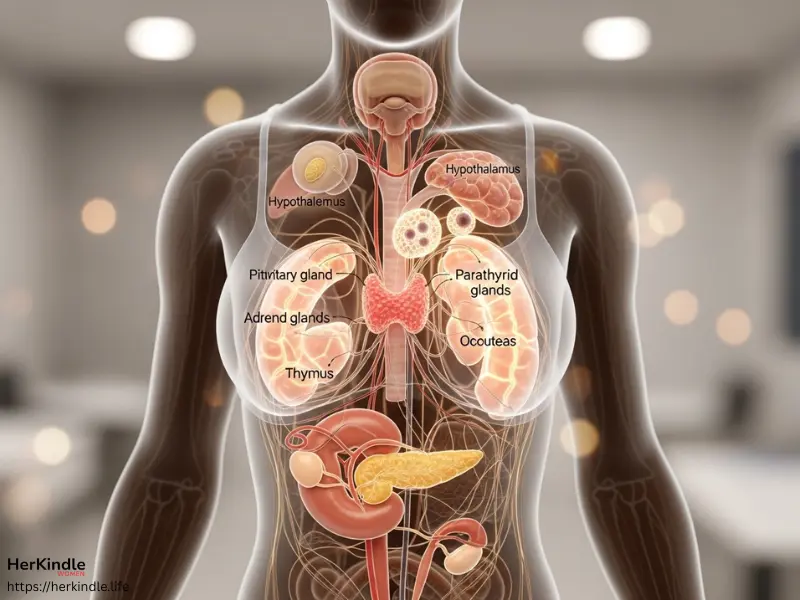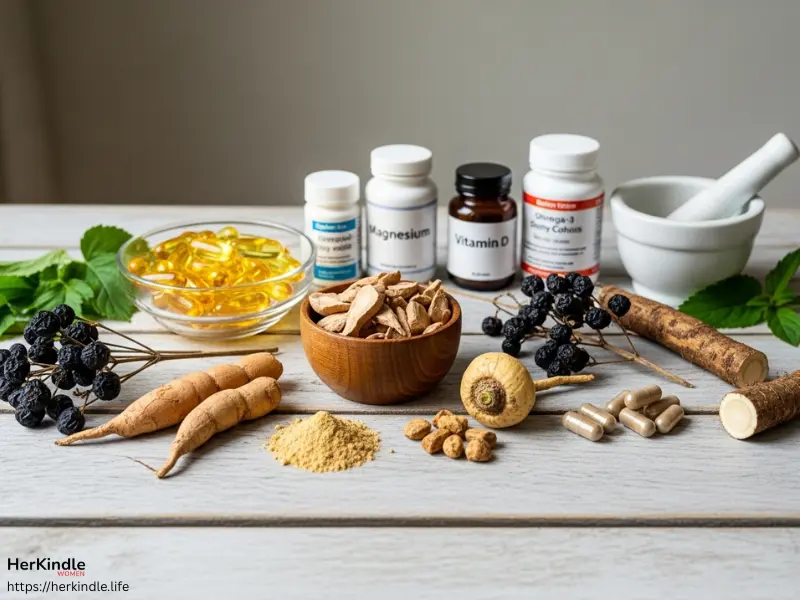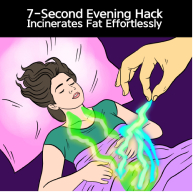Hormones are silent messengers with profound influence over your physical and emotional well-being. If you’re a woman aged 35 or older living in the US or Canada, you may already feel subtle (or not-so-subtle) changes—unexplained fatigue, mood swings, weight gain, or sleep disturbances. These may not just be part of “getting older.” They could be signals from your endocrine system whispering for help.
In this guide, we’ll walk together through the science and soul of hormone balance—helping you understand what’s happening inside your body, how to respond with empathy and wisdom, and which natural and medical tools are available to support you.
Let’s begin the journey to reclaim your hormonal harmony.
Understanding the Endocrine System: The Foundation of Hormonal Health
Your endocrine system is a sophisticated network of glands that release hormones—chemical messengers that regulate metabolism, energy levels, sleep, mood, reproduction, and more. These glands include the pituitary, thyroid, adrenals, pancreas, and ovaries.

Key Endocrine Glands and Their Functions
- Hypothalamus: The command center linking your brain to hormones.
- Pituitary gland: Known as the “master gland,” directing others like the thyroid and adrenals.
- Thyroid: Controls your metabolism and energy usage.
- Adrenal glands: Handle your response to stress via cortisol and adrenaline.
- Ovaries: Produce estrogen and progesterone, key to menstrual and reproductive health.
- Pancreas: Regulates blood sugar through insulin and glucagon.
When these glands function in harmony, so do you. But when they’re out of sync, the effects ripple throughout your body.
Recognizing Hormonal Imbalance Symptoms
Hormonal imbalance isn’t always easy to spot. Symptoms can be subtle, diverse, and easily mistaken for stress or aging.
Common Symptoms in Women Over 35:
- Irregular or heavy periods
- Fatigue despite sleeping
- Sudden weight gain or bloating
- Low libido
- Mood swings, anxiety, or depression
- Hot flashes or night sweats
- Trouble concentrating or “brain fog”
- Sleep disturbances
- Hair thinning or skin changes
If you’re experiencing several of these symptoms, it may be time to explore your hormone levels through testing.
Diagnostic Tools
- Blood tests for estrogen, progesterone, cortisol, thyroid hormones, and more.
- Saliva tests for diurnal cortisol rhythm.
- Imaging or ultrasounds to assess gland function (especially thyroid or ovaries).
Consulting a provider who specializes in hormone health is essential to interpreting these results in context.
Lifestyle and Environmental Factors Disrupting Hormonal Balance
Hormones thrive in balance—but modern life constantly disrupts this delicate equilibrium.
1. Chronic Stress and Cortisol Overload
Chronic stress keeps cortisol elevated, which interferes with:
- Estrogen and progesterone levels
- Thyroid function
- Blood sugar regulation
2. Poor Sleep
Lack of quality sleep affects:
- Growth hormone production
- Leptin (satiety hormone)
- Ghrelin (hunger hormone)
- Melatonin and cortisol cycles
3. Diet and Nutrient Deficiencies
Highly processed foods, sugar, and caffeine wreak havoc on insulin and estrogen. Meanwhile, missing nutrients like magnesium, zinc, and vitamin D can impair hormone production.
4. Environmental Toxins (EDCs)
Endocrine-disrupting chemicals (EDCs) are found in:
- Plastics (BPA, phthalates)
- Non-organic food (pesticides)
- Personal care and cleaning products (parabens, fragrances)
These chemicals mimic or block hormones, disrupting natural cycles and contributing to estrogen dominance, thyroid disorders, and more.
How to Balance Hormones Naturally
Achieving natural hormone balance is not only possible—it’s empowering.
1. Nutrition for Hormonal Health
Focus on whole, nutrient-rich foods:
- Healthy fats (avocados, nuts, olive oil) support estrogen and progesterone.
- Cruciferous vegetables (broccoli, kale) aid estrogen detox.
- Protein (especially from clean sources) supports hormone synthesis.
- Fiber regulates estrogen and supports detoxification.
Avoid:
- Refined sugars
- Trans fats
- Excess alcohol and caffeine
2. Stress Management Techniques
- Mindfulness and meditation
- Deep breathing
- Journaling
- Spending time in nature
- Therapy or coaching
Even 10 minutes a day can reduce cortisol and support hormonal repair.
3. Movement Matters
- Moderate exercise like walking, yoga, Pilates, and strength training balances insulin, estrogen, and cortisol.
- Avoid overtraining, which can backfire and increase cortisol.
4. Sleep Hygiene
Aim for 7–9 hours of restful, uninterrupted sleep by:
- Maintaining a regular sleep-wake schedule
- Creating a tech-free, dark, cool bedroom
- Avoiding screens and caffeine before bedtime
5. Reduce Toxin Exposure
- Use glass or stainless steel instead of plastic
- Switch to natural personal care products
- Buy organic produce and hormone-free meats
- Filter your water
Natural Supplements and Herbs to Support Hormone Balance
Supplements can support hormonal equilibrium when used intentionally.

Top Natural Remedies:
- Ashwagandha: Supports adrenal health and reduces cortisol
- Maca root: May support estrogen balance and improve libido
- Chasteberry (Vitex): Supports progesterone and menstrual cycle regularity
- Black Cohosh: Eases menopause symptoms
- Magnesium: Vital for adrenal and thyroid function
- Vitamin D: Regulates estrogen, insulin, and immune health
- Omega-3 fatty acids: Reduce inflammation and support hormone production
Always consult your healthcare provider before beginning any new supplement.
Medical Options: When Natural Isn’t Enough
Sometimes, lifestyle changes aren’t enough—especially in cases of menopause, PCOS, or hypothyroidism.
Hormone Replacement Therapy (HRT)
HRT helps replace declining estrogen and progesterone levels in perimenopausal or menopausal women. Benefits include:
- Reduced hot flashes and night sweats
- Improved sleep and mood
- Preservation of bone density
HRT comes in many forms:
- Oral tablets
- Transdermal patches and gels
- Vaginal creams or rings
- Pellets or injections
Is HRT Right for You?
HRT is not one-size-fits-all. Your provider will assess:
- Symptom severity
- Personal and family health history
- Risk factors for heart disease, breast cancer, or stroke
The goal? Lowest effective dose, shortest duration—with regular reassessment.
Your Action Plan: Steps Toward Hormone Harmony

Feeling overwhelmed? Here’s a simple plan to move forward:
- Track your symptoms for 30 days.
- Get tested: blood, saliva, or urine hormone panels.
- Clean up your lifestyle:
- Improve sleep
- Manage stress
- Eat nourishing foods
- Reduce exposure to endocrine disruptors
- Consider supplementation under professional guidance
- Discuss HRT options if symptoms persist
- Create a support system (coaches, practitioners, community)
You don’t have to do it all at once. Small, consistent steps make a big difference. If you want to learn more about healthy eating, click here
FAQs: Hormonal Imbalance & Natural Remedies
A: Aging, perimenopause, chronic stress, poor diet, lack of sleep, and toxin exposure are common culprits.
A: Focus on whole-food nutrition, quality sleep, regular movement, stress reduction, and reducing toxins.
A: Fatigue, mood swings, irregular periods, weight gain, and brain fog are common.
A: For many women, HRT is safe when monitored closely. Risks and benefits must be weighed individually.
A: Yes—ashwagandha, maca, chasteberry, omega-3s, magnesium, and vitamin D all show promising effects.
Conclusion: Empowered, Informed, and In Balance
Hormonal health is not a luxury—it’s a foundation for your well-being. By understanding your endocrine system, recognizing the symptoms of hormonal imbalance, and embracing both natural and medical solutions, you reclaim power over your energy, vitality, and joy.
Let hormone harmony be your new normal—not the exception.
You are not alone. Thousands of women are walking this journey with you. Keep asking, exploring, and choosing what’s best for you.







